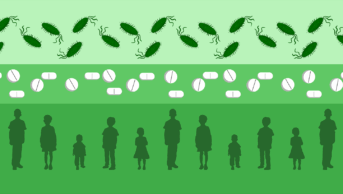Introduction
The use of medicines is the most common therapeutic intervention carried out in the NHS.[1]
The number of children receiving medical treatment is rising; an estimated 200 million prescriptions for children and adolescents were issued in the UK during 2002.[2]
The well established link between sugar and dental caries and the widespread use of sugar-based liquid oral medicines, particularly in paediatric medicine, is a continuing cause for concern among health professionals.[3]
Although it is easy to imagine that the amount of sugar in sugar-containing oral medicines is not significant, research has shown an association between sugar containing oral medicines and dental caries.[4]
Standard 10 of the Children’s National Service Framework “Medicines for children and young people” states that a large number of medicines that are prescribed and dispensed for children contain sugar and are a potential cause of tooth decay.[1]
Deprivation is an extensive problem in South Tyneside; almost two thirds of residents live in areas that rank in the worst 25 per cent for deprivation nationally. The Index of Deprivation 2004 shows that almost one third of South Tyneside’s children are in families that are income-deprived; in the North Jarrow area 70 per cent of children are in families that are income-deprived. Dental decay affects large numbers of five-year-old children.[5]
In South Tyneside, 53.4 per cent of five-year-old children have active decay or have had fillings or extractions.[6]
It may be worth noting that the water supply in South Tyneside is not fluoridated.
Frequent and high consumption of sugars is the major cause of dental decay. Dental caries are caused by the action of organic acids on the enamel of the tooth surface. Fermentable carbohydrates, principally sugars, are rapidly converted to acid by bacteria in plaque causing demineralisation (the loss of calcium and phosphate from the enamel).
After a period (usually about 20 minutes but possibly up to two hours), the acid is dissipated and remineralisation, where lost mineral may be slowly replaced from saliva, occurs. If sugars are consumed frequently then demineralisation may outweigh remineralisation leading to eventual breakdown of enamel and formation of a cavity.[7]
Sugar-containing medicines contribute to total sugar consumption. Children may be exposed to liquid oral medicines intermittently, when the medicine may be prescribed or purchased over the counter, or on a long-term basis when taking prescribed medicines for a chronic condition. Dietary advice should be aimed at limiting the amount and especially the frequency of sugar intake. When consumed, sugars should be part of a meal, not taken between meals. Children often take medicines between meals, last thing at night and through the night, greatly increasing their frequency of consumption of sugar and therefore their likelihood of developing caries. Evidence exists to show that children who have been given medicines containing non-milk extrinsic sugars have higher levels of dental caries.[8],[9]
Children who require medicines long-term are frequently those for whom dental disease and its treatment carry the greatest potential risk and for whom effective prevention of dental disease should be a priority. The use of sugars in medicines should be discouraged and sugar-free liquid medicines should be chosen whenever possible, particularly for long-term use.
The NSF recommends that primary care trusts, NHS trusts and other organisations should incorporate the use of medicines in children in their clinical governance and audit arrangements. Essential service 8 of the community pharmacy contractual framework states that pharmacists must now participate in at least two clinical audits every year: at least one practice-based audit and one PCT-determined audit. Despite an increase in the number of sugar-free preparations available it was questioned as to how frequently sugar free formulations were requested on prescriptions. South Tyneside PCT developed a borough wide, multidisciplinary clinical audit to observe the prescribing habits of all primary care prescribers dispensing oral liquid medication to children under 16 years of age to determine if they specified “sugar-free” on the prescription. The main aim of the audit was to determine if sugar-free medicines were being prescribed, and to inform and promote the use of sugar-free medicines for children.
Method
Every prescription received by a community pharmacist for an oral liquid medicine for a child under the age of 16 years was recorded. The audit recorded who issued the prescription (GP, dentist, nurse, out-of-hours service or other), what medicine had been prescribed, if sugar-free was requested on the prescription and whether the medicine prescribed was available in a sugar-free formulation. Data were collected over a two-week period beginning on 21 November 2005.
Results
Twenty-four pharmacies returned data, a response rate of 73 per cent. A total of 676 prescription items for 37 oral liquids were issued for a child aged under 16 years during the two-week period. Ninety per cent of the prescriptions came from GPs, 4 per cent from dentists, 3 per cent from nurses, 2 per cent from out-of-hours services, and 1 per cent from other sources.
Of the 676 items prescribed 49 per cent did not indicate “sugar free” on the prescription. A total of 37 different medicines were prescribed. Thirty-three (5 per cent) of the prescriptions written were for medicines not available in a sugar-free formulation (Table 1).
| Discipline | Sugar free | Sugar formulation |
| GP | 52% | 48% |
| Dentist | 46% | 54% |
| Nurse | 71% | 29% |
| Out-of-hours | 93% | 7% |
| Other | 67% | 33% |
Discussion
It is evident that despite the well-established link between sugar-based liquid medicines and dental caries and the guidance issued in the Children’s NSF, prescribers continue to issue prescriptions for sugar-based medicines for children.
This audit established that 49 per cent of prescriptions issued within South Tyneside during the two-week audit period did not specify “sugar-free”.
It is important that the PCT tackles this issue and works to inform and educate all staff with a responsibility for prescribing or supply of medicines.
Ways in which to tackle this problem were considered and a number of recommendations were made (see Panel below).
A further audit will be carried out in 12 months following implementation of the recommendations.
Panel: Recommendations
- Update GP IT systems to default to sugar-free medicines
- Provide staff who handwrite prescriptions with a “sugar free” stamp in order to stamp all prescriptions they issue
- Roll out education and training sessions to raise awareness of issue
- Educate prescribers and pharmacists to advise parents and carers to administer medicines with food where possible to limit the frequency of sugar intake
- Encourage community pharmacists to stock and recommend over-the-counter sugar-free medicines
- Encourage community pharmacists to supply sugar-free medicines against all prescriptions for oral liquids where possible
About the authors
Claire Kelly, BA, is clinical audit, research and development facilitator, Mark Burdon, BSc, MRPharmS, is community pharmacy development and clinical governance facilitator, Anne Archer, is dental health facilitator, Kathryn Featherstone, BSc, MRPharmS, is head of medicines management and Pam Lee, MPH, is public health specialist at South Tyneside Primary Care Trust. David Carter, MSc, MRPharmS, is managing director and superintendent pharmacist at DL Carter & Son Ltd and chairman of the Gateshead & South Tyneside Local Pharmaceutical Committee.
Correspondence to: Claire Kelly, South Tyneside Primary Care Trust, Clarendon, Windmill Way, Hebburn, Tyne and Wear NE31 1AT
(e-mail claire.kelly@stpct.nhs.uk)
References
[1] Pitts NB, Boyles J, Nugent ZJ, Thomas N, Pine CM. BASCD Survey Report. The dental caries experience of 5-year-old children in England and Wales. Surveys coordinated by the British Association for the study of Community Dentistry in 2001/2002. Community Dental Health 2002;20:45–54.
[2] Costello I, Wong ICK, Nunn AJ. A literature review to identify interventions to improve the use of sugar free medicines in children. Child Care, Health and Development 2004;30:647–665.
[3] Department of Health, Department for Education and Skills. National Service Framework for Children, Young People and Maternity Services. London: Stationery Office, 2004.
[4] Hobson P. Sugar based medicines and dental disease. Community Dental Health 1985;2:57–62.
[5] Kenny DJ, Somaya P. Sugar load of oral liquid medications on chronically ill children. Journal of the Canadian Dental Association 1989;55:43–46
[6] Levine R, Stillman-Lowe C. The scientific basis of oral health education. London: BDJ Books; 2004.
[7] Roberts GJ, Roberts IF. Dental disease in chronically sick children. Journal of Dentistry for Children 1981;8:346–51.
[8] Scottish Intercollegiate Guidelines Network. Publication 47. Preventing dental caries in children at high caries risk. Edinburgh: SIGN; 2000.
[9] Indices of Deprivation 2004. Available at:www.communities.gov.uk (accessed 11 October 2006).


